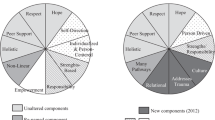Abstract
Mental health and substance use disorders co-occur frequently, and are associated with poorer outcomes in life domains including housing, employment, health, and recovery. Finding evidence-based interventions for engagement and recovery can be a challenge for practitioners and organizations, as it involves accepting new interventions, and then implementing and measuring the results. However, practitioners frequently use their opinions or non-generalizable experiences rather than evidence-based findings to guide their practice. Medication-assisted therapy programs, especially for individuals with co-occurring mental health and substance use disorders, is an area of treatment where there are solid evidence-based outcome findings and where, nonetheless, many practitioners continue to use less-, or non-effective treatment approaches. Conflict between groups of staff using two different approaches can have serious negative impact on treatment outcome. These can be effectively addressed through a combination of education and interventions aimed at resolving intra-staff conflict.
Similar content being viewed by others
References
Amato, L., Minozzi, S., Davoli, M., & Vecchi, S. (2011). Psychosocial combined with agonist maintenance treatments versus agonist maintenance treatments alone for treatment of opioid dependence. Cochrane Database of Systematic Reviews. https://doi.org/10.1002/14651858.CD004147.pub4.
Amodeo, M., Lundgren, L., Fernanda Beltrame, C., Chassler, D., Cohen, A.., & D’Ippolito, M. (2013). Facilitating factors in implementing four evidence-based practices: Reports from addiction treatment staff. Substance Use and Misuse, 48(8), 600–611.
Amodeo, M., Lundgren, L., Cohen, A., Rose, D., Chassler, D., Beltrame, C., & D’Ippolito, M. (2011). Barriers to implementing evidence-based practices in addiction treatment programs: Comparing staff reports on motivational interviewing, adolescent community reinforcement approach, assertive community treatment, and cognitive-behavioral therapy. Evaluation and Program Planning, 34(4), 382–389.
Campbell, A., & Hemsley, S. (2009). Outcome Rating Scale and Session Rating Scale in psychological practice: Clinical utility of ultra-brief measures. Clinical Psychologist, 13(1), 1–9.
Drake, R. E., O’Neal, E. L., & Wallach, M. A. (2008). A systematic review of psychosocial research on psychosocial interventions for people with co-occurring mental and substance use disorders. Journal of Substance Abuse Treatment, 34, 123–138.
Duncan, B. L., Miller, S. D., Sparks, J. A, Claud, D. A., Reynolds, L. R., Brown, J., & Johnson, L. D. (2003). The session rating scale: Preliminary psychometric properties of a “working” alliance measure. Journal of Brief Therapy, 3(1), 3–12.
Fixsen, D. L., Naoom, S. F., Blasé, K. A., Friedman, R. M., & Wallace, F. (2005). Implementation research: A synthesis of the literature (FMHI Publication #231). Tampa, FL: University of South Florida, Louis de la Parte Florida Mental Health Institute, The National Implementation Research Network.
Garner, B. R. (2009). Research on the diffusion of evidence-based treatments within substance abuse treatment: A systematic review. Journal of Substance Abuse Treatment, 36(4), 376–399.
Green, A. I., Drake, R. E., Brunette, M. F., & Noordsy, D. L. (2007). Schizophrenia and co-occurring substance use disorder. American Journal of Psychiatry, 164(3), 402–408.
Harrison, J., Curtis, A., Cousins, L., & Spybrook, J. (2017). Integrated dual disorder treatment implementation in a large state sample. Community Mental Health Journal, 53(3), 358–366. https://doi.org/10.1007/s10597-016-0019-1.
Harrison, J., Spybrook, J., Curtis, A., & Cousins, L. (2016). Integrated dual disorder treatment: Fidelity and implementation over time. Social Work Research, 41(2), 111–120. https://doi.org/10.1093/swr/svx002.
Hasin, D., & Kilcoyne, B. (2012). Comorbidity of psychiatric and substance use disorders in the United States: Current issues and findings from the NESARC. Current Opinions in Psychiatry, 25, 165–171.
Hunt, G. E., Siegfried, N., Morley, K., Sitharthan, T., & Cleary, M. (2013). Psychosocial interventions for people with both severe mental illness and substance misuse. Cochrane Database of Systematic Reviews, 10, 1–258.
Institute of Medicine (IOM). (2006). Improving the quality of health care for mental and substance-use conditions. Washington, DC: National Academies Press.
Kampman, K., & Jarvis, M. (2015). American Society of Addiction Medicine (ASAM) national practice guideline for the use of medications in the treatment of addiction involving opioid use. Journal of Addiction Medicine, 9, 1–10.
Lai, H. M., & Sitharthan, T. (2012). Exploration of the comorbidity of cannabis use disorders and mental health disorders among inpatients presenting to all hospitals in New South Wales, Australia. American Journal of Drug & Alcohol Abuse, 38(6), 567–574.
Lai, H. M., Sitharthan, T., & Huang, Q. R. (2012). Exploration of the comorbidity of alcohol use disorders and mental health disorders among inpatients presenting to all hospitals in New South Wales, Australia. Substance Abuse, 33(2), 138–145.
Mee-Lee, D., & Harrison, J. (2010). Tips and topics: Opening the toolbox for transforming services and systems. The Change Companies: Carson City, NV.
Mueser, K. T., Noordsy, D. L., Drake, R. E., & Fox, L. (2003). Integrated treatment for dual disorders: A guide to effective practice. New York: The Guilford Press.
Ogden, T. A., & Fixsen, D. L. (2014). Implementation science: A brief overview and a look ahead. Journal of Psychology, 222(1), 4–11.
Sackett, D. L., Straus, S. E., Richardson, W. C., Rosenberg, W., & Haynes, R. M. (2000). Evidence-based medicine: How to practice and teach EBM. New York: Churchill Livingstone.
Schmidt, L. M., Hesse, M., & Lykke, J. (2011). The impact of substance use disorders on the course of schizophrenia—A 15-year follow-up study: Dual diagnosis over 15 years. Schizophrenia Research, 130(1–3), 228–233.
Substance Abuse and Mental Health Services Administration, Center for Behavioral Health Statistics and Quality. (2014). The NSDUH report: Substance use and mental health estimates from the 2013 National Survey on Drug Use and Health: Overview of findings. Rockville, MD: Substance Abuse and Mental Health Services Administration, Center for Behavioral Health Statistics and Quality.
Tyrer, P., & Weaver, T. (2004). Desperately seeking solutions: The search for appropriate treatment for comorbid substance misuse and psychosis. Psychiatric Bulletin, 28(1), 1–2.
Warren, J. I., Stein, J. A., & Grella, C. E. (2007). Role of social support and self-efficacy in treatment outcomes among clients with co-occurring disorders. Drug and Alcohol Dependence, 89(2–3), 267–274.
Author information
Authors and Affiliations
Corresponding author
Rights and permissions
About this article
Cite this article
Lowis, M.M., Harrison, J. & Wiland, S. Becoming an Evidence-Based Practitioner. Community Ment Health J 55, 24–30 (2019). https://doi.org/10.1007/s10597-018-0261-9
Received:
Accepted:
Published:
Issue Date:
DOI: https://doi.org/10.1007/s10597-018-0261-9




